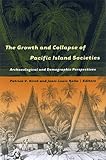The Growth and Collapse of Pacific Island Societies : Archaeological and Demographic Perspectives / ed. by Patrick Vinton Kirch, Jean-Louis Rallu.
Material type: TextPublisher: Honolulu : University of Hawaii Press, [2007]Copyright date: ©2007Description: 1 online resource (432 p.) : 71 illusContent type:
TextPublisher: Honolulu : University of Hawaii Press, [2007]Copyright date: ©2007Description: 1 online resource (432 p.) : 71 illusContent type: - 9780824831349
- 9780824864767
- 306.0995 22
- GN662 .G76 2007eb
- online - DeGruyter
- Issued also in print.
| Item type | Current library | Call number | URL | Status | Notes | Barcode | |
|---|---|---|---|---|---|---|---|
 eBook
eBook
|
Biblioteca "Angelicum" Pont. Univ. S.Tommaso d'Aquino Nuvola online | online - DeGruyter (Browse shelf(Opens below)) | Online access | Not for loan (Accesso limitato) | Accesso per gli utenti autorizzati / Access for authorized users | (dgr)9780824864767 |
Frontmatter -- Contents -- List of Tables -- List of Figures -- Preface -- 1. Long-Term Demographic Evolution in the Pacific Islands -- 2. Pre- and Post-Contact Population in Island Polynesia -- 3. Demography and Food in Early Polynesia -- 4. "Like Shoals of Fish" -- 5. Modeling Agricultural Development and Demography in Kohala, Hawai'i -- 6. Paleodemography in Kahikinui, Maui -- 7. Reconstructing Hawaiian Population at European Contact -- 8. Pre-Contact Population in the 'Opunohu Valley, Mo'orea -- 9. Estimating the Population of Hokatu Valley, Ua Huka Island (Marquesas, French Polynesia) According to the Archaeological Remains -- 10. Archaeological Demography and Population Growth in the Kingdom of Tonga -- 11. Protohistoric Samoan Population -- 12. An Accent on Atolls in Approaches to Population Histories of Remote Oceania -- 13. Prehistoric Population Growth on Kosrae, Eastern Caroline Islands -- 14. Population in a Vegetable Kingdom -- 15. What were the Real Numbers? -- 16. Concluding Remarks -- References -- List of Contributors -- Index
restricted access online access with authorization star
http://purl.org/coar/access_right/c_16ec
Were there major population collapses on Pacific Islands following first contact with the West? If so, what were the actual population numbers for islands such as Hawai'i, Tahiti, or New Caledonia? Is it possible to develop new methods for tracking the long-term histories of island populations? These and related questions are at the heart of this new book, which draws together cutting-edge research by archaeologists, ethnographers, and demographers.In their accounts of exploration, early European voyagers in the Pacific frequently described the teeming populations they encountered on island after island. Yet missionary censuses and later nineteenth-century records often indicate much smaller populations on Pacific Islands, leading many scholars to debunk the explorers' figures as romantic exaggerations. Recently, the debate over the indigenous populations of the Pacific has intensified, and this book addresses the problem from new perspectives. Rather than rehash old data and arguments about the validity of explorers' or missionaries' accounts, the contributors to this volume offer a series of case studies grounded in new empirical data derived from original archaeological fieldwork and from archival historical research. Case studies are presented for the Hawaiian Islands, Mo'orea, the Marquesas, Tonga, Samoa, the Tokelau Islands, New Caledonia, Aneityum (Vanuatu), and Kosrae.
Issued also in print.
Mode of access: Internet via World Wide Web.
In English.
Description based on online resource; title from PDF title page (publisher's Web site, viewed 02. Mrz 2022)


